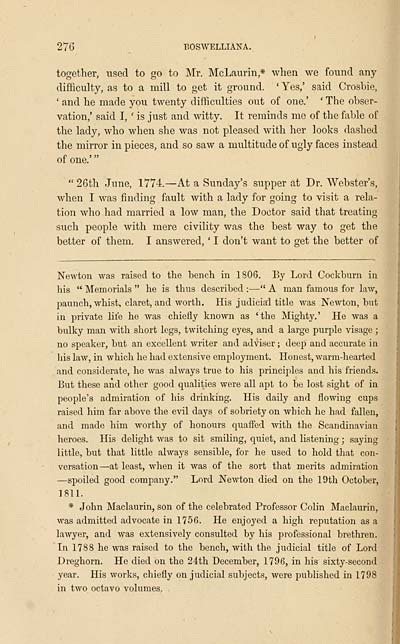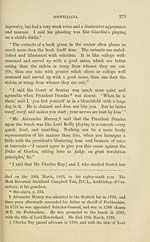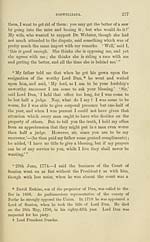Grampian Club > Boswelliana
(310) Page 276
Download files
Complete book:
Individual page:
Thumbnail gallery: Grid view | List view

276 BOSWELLIANA.
together, used to go to Mr. McLaurin * when we found any
difficulty, as to a mill to get it ground. 'Yes,' said Crosbie,
' and he made you twenty difficulties out of one.' ' The obser-
vation,' said I, ' is just and witty. It reminds me of the fable of
the lady, who when she was not pleased with her looks dashed
the mirror in pieces, and so saw a multitude of ugly faces instead
of one.' "
" 26th June, 1774. — At a Sunday's supper at Dr. Webster's,
when I was finding fault with a lady for going to visit a rela-
tion who had married a low man, the Doctor said that treating
such people with mere civility was the best way to get the
better of them. I answered, ' I don't want to get the better of
Newton was raised to the bench in 1806. By Lord Cockburn in
his " Memorials " he is thus described : — " A man famous for law,
paunch, whist, claret, and worth. His judiciarl title was Newton, but
in private lite he was chiefly known as 'the Mighty.' He was a
biilky man with short legs, twitching eyes, and a large purple visage ;
no speaker, but an excellent writer and adviser ; deep and accurate in
his law, in which he had extensive employment. Honest, warm-hearted
and considerate, he was always true to his principles and his friends.
But these and other good qualities were all apt to be lost sight of in
people's admiration of his drinking. His daily and flowing cups
raised him far above the evil days of sobriety on which he had fallen,
and made him worthy of honours quaff"ed with the Scandinavian
heroes. His delight was to sit smiling, quiet, and listening ; saying
little, but that little always sensible, for he used to hold that con-
versation — at least, when it was of the sort that merits admiration
— spoiled good company." Lord Newton died on the 19th October,
181L
* John Maclaurin, son of the celebrated Professor Colin Maclaurin,
was admitted advocate in 1756. He enjoyed a high reputation as a
lawyer, and was extensively consulted by his professional brethren.
In 1788 he was raised to the bench, with the judicial title of Lord
Dreghorn. He died on the 24th December, 1796, in his sixty-second
year. His works, chiefly on judicial subjects, were published in 1798
in two octavo volumes.
together, used to go to Mr. McLaurin * when we found any
difficulty, as to a mill to get it ground. 'Yes,' said Crosbie,
' and he made you twenty difficulties out of one.' ' The obser-
vation,' said I, ' is just and witty. It reminds me of the fable of
the lady, who when she was not pleased with her looks dashed
the mirror in pieces, and so saw a multitude of ugly faces instead
of one.' "
" 26th June, 1774. — At a Sunday's supper at Dr. Webster's,
when I was finding fault with a lady for going to visit a rela-
tion who had married a low man, the Doctor said that treating
such people with mere civility was the best way to get the
better of them. I answered, ' I don't want to get the better of
Newton was raised to the bench in 1806. By Lord Cockburn in
his " Memorials " he is thus described : — " A man famous for law,
paunch, whist, claret, and worth. His judiciarl title was Newton, but
in private lite he was chiefly known as 'the Mighty.' He was a
biilky man with short legs, twitching eyes, and a large purple visage ;
no speaker, but an excellent writer and adviser ; deep and accurate in
his law, in which he had extensive employment. Honest, warm-hearted
and considerate, he was always true to his principles and his friends.
But these and other good qualities were all apt to be lost sight of in
people's admiration of his drinking. His daily and flowing cups
raised him far above the evil days of sobriety on which he had fallen,
and made him worthy of honours quaff"ed with the Scandinavian
heroes. His delight was to sit smiling, quiet, and listening ; saying
little, but that little always sensible, for he used to hold that con-
versation — at least, when it was of the sort that merits admiration
— spoiled good company." Lord Newton died on the 19th October,
181L
* John Maclaurin, son of the celebrated Professor Colin Maclaurin,
was admitted advocate in 1756. He enjoyed a high reputation as a
lawyer, and was extensively consulted by his professional brethren.
In 1788 he was raised to the bench, with the judicial title of Lord
Dreghorn. He died on the 24th December, 1796, in his sixty-second
year. His works, chiefly on judicial subjects, were published in 1798
in two octavo volumes.
Set display mode to: Large image | Transcription
Images and transcriptions on this page, including medium image downloads, may be used under the Creative Commons Attribution 4.0 International Licence unless otherwise stated. ![]()
| Publications by Scottish clubs > Grampian Club > Boswelliana > (310) Page 276 |
|---|
| Permanent URL | https://digital.nls.uk/82555124 |
|---|
| Description | Note: Numbers 24-41 are relative to but not part of the Club's series. |
|---|---|

